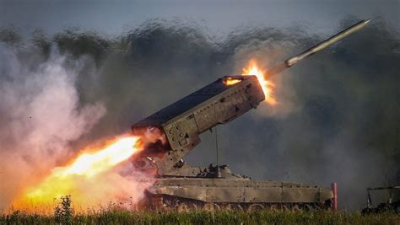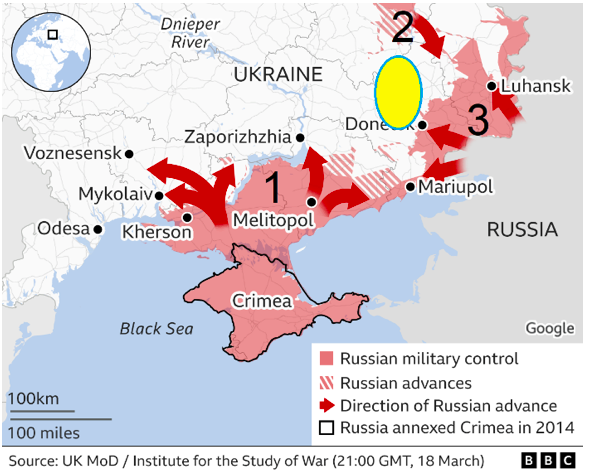Invasion of Ukraine: What Are the Russians Up to?

The Donbas region of eastern Ukraine is one of the reasons why the Russian invasion was planned. According to Western defense analysts, this area could also be decisive in how the war ends. An insight into Russian strategy.
Russia’s strategy has been much debated since the start of the invasion on February 24. In the initial phase, it was not clear what the Kremlin was planning. But after a month, the contours of that plan begin to take shape. In a recent well-documented article, the Financial Times makes a commendable effort at unravelling the strategy of the Russian army.
Three fronts
According to the business newspaper, the Russian army is advancing along three fronts (see map). The armed forces involved are among the best trained in the country, according to analysts.
First, there is an offensive northeast of Crimea. The attack on the port of Odessa is said to be a diversionary tactic to detain Ukrainian troops in the south so that they cannot come and help their colleagues in Mariupol.
A second front is on the Russian border and is moving south, past the besieged city of Kharkov.
A third front consists of Russian-backed separatists who, along with key units of the Russian army, are advancing west from the Donbas.
Double strategy
The current strategy is twofold, focusing mainly on the Donbas region. The first objective is to bomb a number of cities with artillery and rocket attacks and to consolidate the area around those cities. These are strategically important cities such as Kharkiv. Those surrounded cities could then potentially be used as bargaining chips in peace talks.
According to Jacques Baud, a former colonel in the Swiss army and a strategic analyst, the Russian army has no intention – with exceptions – to occupy or conquer the cities themselves. This is something which seems to be confirmed by a recent Newsweek article.
The second objective is the most important: to defeat the troops in Mariupol and to encircle the Ukrainian troops in the Donbas (marked in yellow and blue on the map). Mariupol is important to establish a land corridor between Russia and Crimea.
Ukrainian troops in the Donbas account for a quarter of the army. If Russia manages to secure those troops there, they will no longer be able to defend cities further west, such as Kyiv.
A heavy blow
According to a NATO officer, Russia has made most progress in this region and ‘Russia has the military mass to break the JFO (the Ukrainian army), and the fact it seems to be acting more methodically is worrying’. If the Russian troops of the three fronts succeed in their encirclement, they can effectively defeat the troops stationed in the Donbas.
The neutralization of a significant part of Ukraine’s regular armed forces would deal a serious moral blow to Kyiv. According to an analyst from the Royal United Services Institute in London, that would make a prolonged siege of Kyiv unnecessary.
For Moscow, one of the main objectives of the invasion would then have been achieved: the demilitarization of Ukraine. It would also gain a strong negotiating position.
Of course, anything can still happen in the field. Nothing is more unpredictable than the outcome of a war. Moreover, the Russian army may have suffered significant losses and may have underestimated the resistance capacity of the Ukrainians.
But the victory bulletins in our mainstream media may mask the vulnerabilities of the Ukrainian army, according to the Financial Times. We must not make the mistake of believing our own propaganda.
*
Note to readers: Please click the share buttons above or below. Follow us on Instagram, @globalresearch_crg and Twitter at @crglobalization. Feel free to repost and share widely Global Research articles.
Marc Vandepitte is a regular contributor to Global Research.



